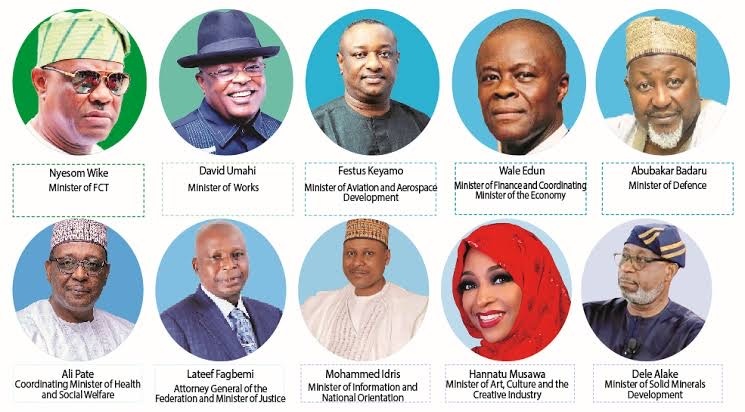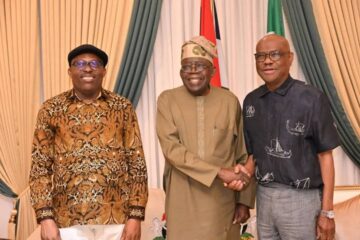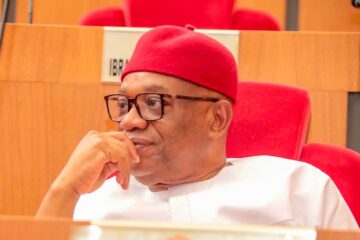Ahead of the commemoration of President Tinubu’s One Year in office on May 29, some serving ministers of the President have been rated poor in their performance.
According to a report released by a civil society group, Consortium of National Democrats (CND) , 17 Ministers scored below 50%.
The group’s assessment released on Tuesday through it’s group’s National Coordinator Prof. Shuaibu Dada urged Tinubu not to hestsistate to fire incompetent Ministers.
Dada Stated that the Ministers failed to bring in the required inputs needed in their various Ministries to turn around the fortunes of the country.
Leading the pack of poor performing Ministers ,Minister of State, Labour and Employment, Nkiruka Onyejeocha was scored 18%.
While with 75% and 72% the Minister of Federal Capital Territory, Nyesom Wike and the Minister of Works, David Umahi were rated highest.
Scoring only 30% were Minister of State Education, Yusuf T. Sunumu; Minister of State, Gas Resources, Ekperikpe Ekpo and Minister of State, Petroleum Resources, Heineken Lokpobiri while the Minister of Power, Adedayo Adelabu and Minister of Women Affairs, Uju Kennedy were rated 33% each.
In security the Minister of Police Affairs, Ibrahim Geidam and his counterpart Minister of State, Police Affairs, Imaan Sulaiman-Ibrahim each rated 35%.
The statement read; “There is a compelling need for cabinet reshuffle, in view of Nigeria’s growing sectoral challenges.
“Mr President is expected to use this opportunity to identify and fire non-performing appointees and engage people who have the capacity to change the narrative”.
The group also rated other cabinet members as follows; Transportation, Ahmed Alkali (68%); State, Attorney General of the Federation and Minister of Justice, Lateef Fagbemi (65%);
Minister of State for Health and Social Welfare, Tunji Alausa (64%); Communications, Innovation and Digital Economy, Bosun Tijani (62%)”.
A 60% rating was accorded to Ministers of ; Interior, Tunji Ojo; Finance and Coordinating Minister of the Economy Wale Edun; Sports Development, John Enoh; Federal Capital Territory (State), Mairiga Mahmud ;Housing and Urban Development, Ahmed M. Dangiwa and Foreign Affairs, Yusuf M. Tuggar.
Others were; “Minister of Information and National Orientation, Muhammed Idris (40%); Minister of Youth, Abubakar Momoh (40%); Minister of Education, Tahir Maman (44%); Trade and Investment, Doris Anite (44%); Minister of Solid Minerals Development, Dele Alake (45%); Minister of Tourism, Lola Ade-John (45%); Minister of Industry and Minister of State, Water Resources and Sanitation, Bello Goronyo with 48%.
The report concluded that; “Minister of Innovation Science and Technology, Uche Nnaji (50%), Minister of Marine and Blue Economy, Bunmi Tunji (53%); Minister of State, Environment and Ecological Management, Ishak Salaco (56%); Minister of Aviation and Aerospace Development, Festus Keyamo (56%); Minister of Aviation and Aerospace Development, Festus Keyamo (56%); Minister of Interior, Sa’Idu A. Alkali (52%);Minister of Special Duties and Intergovernmental Affairs, Zephaniah Jisalo (50%); Minister of Water Resources and Sanitation, Joseph Utsev (58%); Minister of State, Agriculture and Food Security, Aliyu Sabi Abdullah (50%); Minister of State, Housing and Urban Development, Abdullah T. Gwarzo (55%), Coordinating Minister of Health and Social Welfare, Ali Pate (51%); Minister of State, Steel Development, U. Maigari Ahmadu (50%) and Minister of Steel Development, Shuaibu A. Audu (55%).
However, the Ministries of Humanitarian Affairs and Poverty Alleviation and Labour and Employment were exempted from the ratings following the suspension and resignation of their former Ministers.
Considering the above performance report Dada stated that it has become expedient to review and terminate the appointments of non performing Nigerian ministers.
He said; “The Ministers have embarrassed Mr president well enough, inflicted so much hardship on Nigerians, and wasted public funds that could have gone a long way to revive the economy if they were rightly used”.




